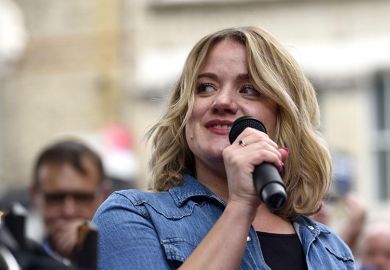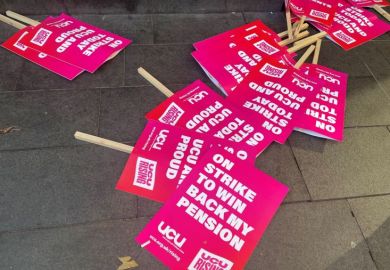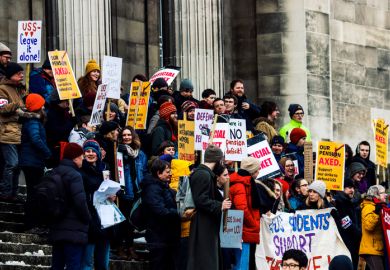A professor who was narrowly defeated in the University and College Union’s general secretary election has called for a recount and alleged that election rules had been “violated”.
Ewan McGaughey lost to the incumbent Jo Grady in the fourth round of voting by 182 votes – 7,758 to 7,576 – which he pointed out represented just 0.1 per cent of the union’s total membership.
The King’s College London law professor collected 4,724 first-preference votes, before gaining 582 second preferences from opponent Saira Weiner, who was eliminated first in the single transferable vote system used by the union, and then 2,270 from Vicky Blake. With 5,990, Dr Grady had more first preferences and won 451 second preferences from Ms Weiner and 1,317 from Ms Blake to get over the line.
In a video posted online late on 4 March, Professor McGaughey pointed out that 148 ballots in the vote were deemed invalid and 1,797 were non-transferable – so, given the “unique circumstances, I’ve got an obligation to ask for a recount”.
“Almost never in the history of union elections has an incumbent general secretary been ousted,” Professor McGaughey told Times Higher Education.
“Given the 0.1 per cent difference in membership between me and the incumbent, and the incumbent’s control of union machinery and communications, it’s essential that we ensure the count was done properly.”
Professor McGaughey has also called for the government to introduce e-balloting for union elections to make it easier for members to participate.
Turnout in this year’s election dipped by more than 6,000 compared with last time, but, at around 15 per cent, was in line with previous votes historically.
Professor McGaughey alleged there had been “really big problems” with the election process, saying the union’s social media had been used “illegitimately” to “campaign for the general secretary” and “campaign-style emails” had been sent by Dr Grady to all members.
“We must also ensure all violations of election rules are fully remedied so that processes are fair for everyone in future,” he said, flagging a case where UCU had removed a post from its official account on X which expressed support for Dr Grady’s campaign, following a complaint by rival candidates.
The union’s poll was scrutinised by Civica Election Services, which found no issues with the vote. A UCU spokesperson said there was “no basis” to the claims.
A formal challenge to the election result would be unprecedented in UCU history and very rare across the trade union sector as a whole. UCU itself lacks an appeals process, but the government appoints a certification officer, currently Sarah Bedwell, to ensure unions comply with their statutory duties.
Professor McGaughey’s vote share took many by surprise in the election as he emerged as the main challenger to Dr Grady over the two more established union figures of Ms Blake, a past president, and Ms Weiner, the UCU Left candidate.
A former president of the King’s College UCU branch, Professor McGaughey stood on his record of securing members at King’s more pay and better childcare support, and his involvement in taking the directors of the Universities Superannuation Scheme to court over cuts to pensions, which he said contributed to the cuts being reversed.
But he faced questions over this crowdfunded case – which lost both at the High Court and at the Court of Appeal – with some claiming it never had much prospect of winning.
Dr Grady faces the challenge of rebuilding the union after the divisions exposed during the election campaign while preparing for the next round of pay negotiations with the Universities and Colleges Employers Association, which begin this month.
The UCU spokesperson said: “All UCU elections are run independently by Civica Election Services, a highly reputable scrutineer with years of experience handling complex ballots for some of the biggest trade unions and organisations in the UK.
“There is simply no basis whatsoever to support the claims made by Professor McGaughey.”
Register to continue
Why register?
- Registration is free and only takes a moment
- Once registered, you can read 3 articles a month
- Sign up for our newsletter
Subscribe
Or subscribe for unlimited access to:
- Unlimited access to news, views, insights & reviews
- Digital editions
- Digital access to THE’s university and college rankings analysis
Already registered or a current subscriber?








